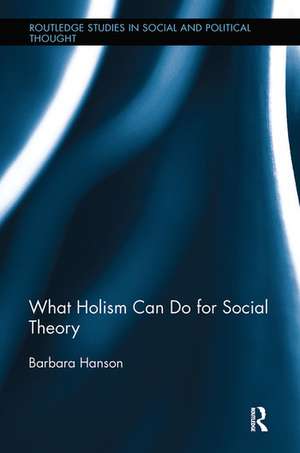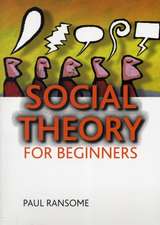What Holism Can Do for Social Theory: Routledge Studies in Social and Political Thought
Autor Barbara Hansonen Limba Engleză Paperback – 7 mar 2018
| Toate formatele și edițiile | Preț | Express |
|---|---|---|
| Paperback (1) | 334.64 lei 6-8 săpt. | |
| Taylor & Francis – 7 mar 2018 | 334.64 lei 6-8 săpt. | |
| Hardback (1) | 846.92 lei 6-8 săpt. | |
| Taylor & Francis – 8 iul 2014 | 846.92 lei 6-8 săpt. |
Din seria Routledge Studies in Social and Political Thought
-
 Preț: 152.42 lei
Preț: 152.42 lei -
 Preț: 296.64 lei
Preț: 296.64 lei -
 Preț: 380.89 lei
Preț: 380.89 lei -
 Preț: 310.96 lei
Preț: 310.96 lei -
 Preț: 287.67 lei
Preț: 287.67 lei -
 Preț: 347.92 lei
Preț: 347.92 lei -
 Preț: 303.87 lei
Preț: 303.87 lei -
 Preț: 333.32 lei
Preț: 333.32 lei -
 Preț: 309.82 lei
Preț: 309.82 lei -
 Preț: 324.20 lei
Preț: 324.20 lei -
 Preț: 221.84 lei
Preț: 221.84 lei -
 Preț: 310.41 lei
Preț: 310.41 lei -
 Preț: 319.01 lei
Preț: 319.01 lei -
 Preț: 311.70 lei
Preț: 311.70 lei -
 Preț: 319.08 lei
Preț: 319.08 lei -
 Preț: 311.41 lei
Preț: 311.41 lei -
 Preț: 338.98 lei
Preț: 338.98 lei -
 Preț: 216.44 lei
Preț: 216.44 lei -
 Preț: 279.47 lei
Preț: 279.47 lei -
 Preț: 347.24 lei
Preț: 347.24 lei -
 Preț: 387.02 lei
Preț: 387.02 lei - 18%
 Preț: 1110.47 lei
Preț: 1110.47 lei - 18%
 Preț: 1055.51 lei
Preț: 1055.51 lei - 18%
 Preț: 1058.43 lei
Preț: 1058.43 lei - 18%
 Preț: 1005.73 lei
Preț: 1005.73 lei - 25%
 Preț: 544.67 lei
Preț: 544.67 lei -
 Preț: 409.73 lei
Preț: 409.73 lei - 18%
 Preț: 1061.22 lei
Preț: 1061.22 lei - 18%
 Preț: 1061.84 lei
Preț: 1061.84 lei - 18%
 Preț: 1215.71 lei
Preț: 1215.71 lei - 18%
 Preț: 998.71 lei
Preț: 998.71 lei - 18%
 Preț: 1109.99 lei
Preț: 1109.99 lei -
 Preț: 488.71 lei
Preț: 488.71 lei - 30%
 Preț: 847.73 lei
Preț: 847.73 lei -
 Preț: 416.12 lei
Preț: 416.12 lei - 18%
 Preț: 1054.75 lei
Preț: 1054.75 lei - 28%
 Preț: 769.72 lei
Preț: 769.72 lei - 18%
 Preț: 1059.84 lei
Preț: 1059.84 lei -
 Preț: 489.99 lei
Preț: 489.99 lei - 18%
 Preț: 1062.31 lei
Preț: 1062.31 lei - 18%
 Preț: 1108.42 lei
Preț: 1108.42 lei -
 Preț: 382.65 lei
Preț: 382.65 lei - 42%
 Preț: 181.06 lei
Preț: 181.06 lei - 26%
 Preț: 822.36 lei
Preț: 822.36 lei - 18%
 Preț: 1219.38 lei
Preț: 1219.38 lei
Preț: 334.64 lei
Preț vechi: 384.91 lei
-13% Nou
Puncte Express: 502
Preț estimativ în valută:
64.03€ • 66.86$ • 52.100£
64.03€ • 66.86$ • 52.100£
Carte tipărită la comandă
Livrare economică 04-18 aprilie
Preluare comenzi: 021 569.72.76
Specificații
ISBN-13: 9781138485037
ISBN-10: 1138485039
Pagini: 194
Dimensiuni: 152 x 229 x 16 mm
Greutate: 0.28 kg
Ediția:1
Editura: Taylor & Francis
Colecția Routledge
Seria Routledge Studies in Social and Political Thought
Locul publicării:Oxford, United Kingdom
ISBN-10: 1138485039
Pagini: 194
Dimensiuni: 152 x 229 x 16 mm
Greutate: 0.28 kg
Ediția:1
Editura: Taylor & Francis
Colecția Routledge
Seria Routledge Studies in Social and Political Thought
Locul publicării:Oxford, United Kingdom
Public țintă
Postgraduate and UndergraduateCuprins
1. Where Have We Been? Where Might We Go? 2. Facticity 3. How Have We Come to Be Doing Mechanism? 4. How Do We Do Mechanism? 5. Beyond Mechanism 6. Sociality 7. Holism, Blame, and Power 8. Moment, Monument, Movement
Descriere
This book reconsiders the nature of positivist philosophy in social science theory based on classical and medieval thought in what later became "Europe." It argues that social theory is being held back by antagonistic debates over science, positivism, objectivity, and universal law - debates which appear unnecessary, narrow, and acontextual when their origins are examined. Positing that solutions to these impasses can be found by moving to alternative holistic epistemology, and looking at issues in terms of interrelations rather than parts, the book shows the promise of a social theory that provides a unit of analysis that mediates between local and global relations.













